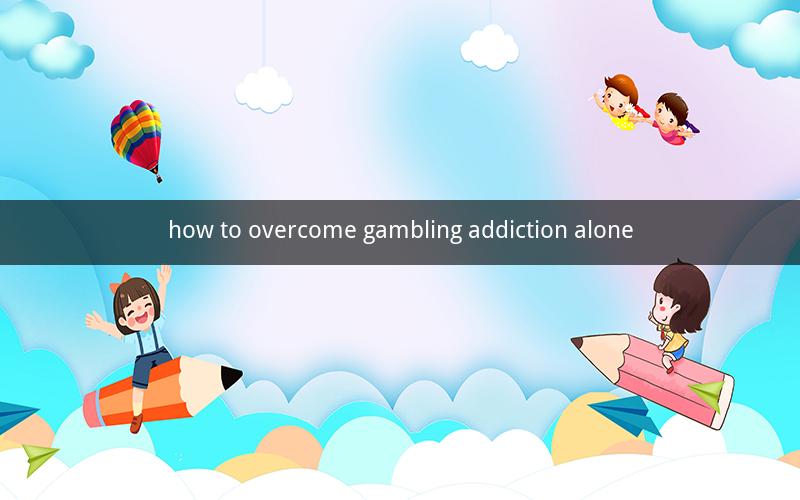
Table of Contents
1. Understanding Gambling Addiction
2. Recognizing the Signs of Gambling Addiction
3. The Psychological and Emotional Impact of Gambling Addiction
4. Strategies for Overcoming Gambling Addiction Alone
- Establishing a Support System
- Identifying Triggers
- Developing Coping Mechanisms
- Seeking Professional Help
5. The Importance of Self-Reflection
6. The Role of Technology in Overcoming Gambling Addiction
7. The Benefits of Joining Support Groups
8. The Long-Term Impact of Overcoming Gambling Addiction
9. Case Studies: Success Stories of Overcoming Gambling Addiction Alone
10. Conclusion
1. Understanding Gambling Addiction
Gambling addiction, also known as problem gambling, is a complex disorder characterized by an inability to control the urge to gamble, despite negative consequences. It is a chronic condition that can affect individuals of all ages, genders, and socioeconomic backgrounds. Overcoming gambling addiction alone can be challenging, but it is possible with the right strategies and support.
2. Recognizing the Signs of Gambling Addiction
Identifying the signs of gambling addiction is crucial for taking the first steps towards recovery. Some common signs include:
- Preoccupation with gambling, including thoughts about when and where to gamble
- Needing to gamble with increasing amounts of money to achieve the desired thrill
- Repeated failed attempts to stop gambling
- Lying to family, friends, or therapists about gambling activities
- Borrowing money or selling possessions to fund gambling habits
- Neglecting responsibilities at work, school, or home due to gambling
3. The Psychological and Emotional Impact of Gambling Addiction
Gambling addiction can have severe psychological and emotional consequences. Some common effects include:
- Depression and anxiety
- Low self-esteem and shame
- Relationship problems
- Financial difficulties
- Legal issues
4. Strategies for Overcoming Gambling Addiction Alone
Overcoming gambling addiction alone requires a combination of self-discipline, support, and coping mechanisms. Here are some strategies to consider:
4.1 Establishing a Support System
Seeking support from friends, family, or support groups can provide emotional support and guidance. Sharing your experiences with others who have faced similar challenges can be incredibly helpful.
4.2 Identifying Triggers
Identifying and avoiding triggers can prevent relapse. Triggers may include certain places, people, or situations that remind you of gambling.
4.3 Developing Coping Mechanisms
Developing healthy coping mechanisms can help manage cravings and reduce the urge to gamble. Some effective coping mechanisms include exercise, meditation, and engaging in hobbies.
4.4 Seeking Professional Help
If you are struggling to overcome gambling addiction alone, seeking professional help from a therapist or counselor can provide personalized support and guidance.
5. The Importance of Self-Reflection
Self-reflection is an essential part of overcoming gambling addiction. It involves examining your thoughts, feelings, and behaviors related to gambling. This process can help you gain insight into the root causes of your addiction and develop a plan for recovery.
6. The Role of Technology in Overcoming Gambling Addiction
Technology can be a double-edged sword when it comes to overcoming gambling addiction. While it can provide access to support groups and resources, it can also be a trigger for relapse. It is important to use technology mindfully and seek out resources that can help you stay on track.
7. The Benefits of Joining Support Groups
Joining a support group can provide a sense of community and shared experiences. Support groups can offer valuable insights, coping strategies, and emotional support.
8. The Long-Term Impact of Overcoming Gambling Addiction
Overcoming gambling addiction alone can have a profound impact on your life. It can lead to improved mental health, stronger relationships, and a greater sense of self-worth.
9. Case Studies: Success Stories of Overcoming Gambling Addiction Alone
Many individuals have successfully overcome gambling addiction alone. These success stories can provide inspiration and hope for those struggling with the same challenges.
10. Conclusion
Overcoming gambling addiction alone is a challenging but achievable goal. By understanding the nature of the addiction, recognizing the signs, and implementing effective strategies, you can take control of your life and move towards a healthier, more fulfilling future.
Questions and Answers
1. What is the most common cause of gambling addiction?
- The cause of gambling addiction can vary, but common factors include genetics, environmental influences, and mental health issues.
2. How long does it take to overcome gambling addiction?
- The duration of recovery can vary depending on the individual and the severity of their addiction.
3. Can gambling addiction be cured?
- While there is no guaranteed cure for gambling addiction, it can be effectively managed and controlled with the right strategies and support.
4. Is there a medication that can help treat gambling addiction?
- There are no medications specifically designed to treat gambling addiction, but some medications may help manage related symptoms, such as depression or anxiety.
5. Can a person with a gambling addiction recover without treatment?
- While some individuals may recover without treatment, seeking professional help can significantly improve the chances of successful recovery.
6. How can I tell if I have a gambling addiction?
- Signs of a gambling addiction include preoccupation with gambling, lying about gambling activities, and neglecting responsibilities due to gambling.
7. Can a person with a gambling addiction return to gambling after recovery?
- It is possible for a person with a gambling addiction to return to gambling after recovery, but it is important to maintain healthy coping mechanisms and seek support if needed.
8. How can I support a loved one with a gambling addiction?
- You can support a loved one with a gambling addiction by offering emotional support, encouraging them to seek professional help, and being patient and understanding.
9. Can gambling addiction lead to other mental health issues?
- Yes, gambling addiction can lead to other mental health issues, such as depression, anxiety, and substance abuse.
10. What is the most effective treatment for gambling addiction?
- The most effective treatment for gambling addiction often involves a combination of therapy, support groups, and self-help strategies.